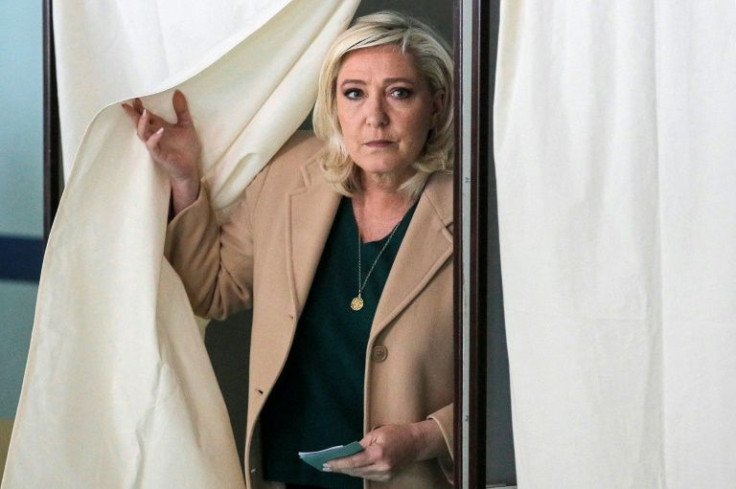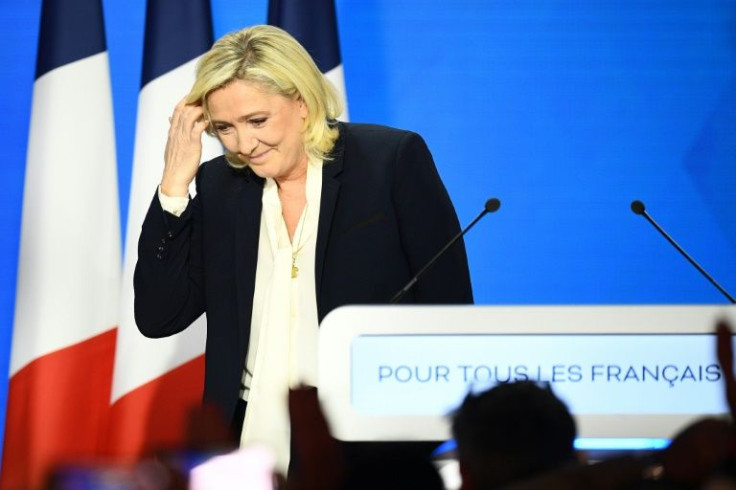Marine Le Pen, A Fighter Suffering Another Big Defeat
Marine Le Pen, who on Sunday lost the second round of France's presidential election to Emmanuel Macron, had fought hard to make her far-right party electable but in the end failed by a wide margin to win over a majority of voters.
Trailing by around 16 percentage points in the second-round runoff according to projections, Le Pen came far closer to power than any far-right leader in France's post-World War II history.
"The ideas we represent have reached new heights... this result itself represents a brilliant victory," she told supporters in a defiant statement after the first estimated results were published.
Le Pen added that she will "carry on" her political career and "lead the battle" against Macron in June's parliamentary elections.
Softening her image and focusing on social and economic issues helped her erode the traditional united front of mainstream French voters that had seen both her and her father off in previous elections.
While the 53-year-old also enjoyed cover from the emergence of Eric Zemmour, a bombastic TV polemicist who is still further to the right, her unprecedented performance owed much to her ability to take the provocative edge off the former National Front.
She renamed the party the National Rally (RN) after expelling her father Jean-Marie in 2015, symbolically breaking with his open racism and anti-Semitic remarks.

Le Pen's focus in this year's campaign on cost-of-living issues in the face of rising inflation, driven in part by Russia's invasion of Ukraine, helped her avoid the second-round TV debate debacle Macron inflicted in 2017.
This time around, the candidates slogged it out over details of policy areas like finances and pension reform -- helping the far-right chief look like just another presidential hopeful.
In fact, "her programme hasn't changed at all from Front National fundamentals like immigration and national identity, but she's chosen a different vocabulary to justify it," said Cecile Alduy, an expert on the far right.
If elected, Le Pen planned measures like removing benefits from many immigrants, repudiating the primacy of EU law and closing the door on most asylum-seekers.
On the last day of the official campaign Friday, she insisted that voters' choice was between "Macron or France".
Le Pen's life has been marked by the legacy of her openly racist father, a veteran of the long war in Algeria that ultimately led to the former French colony's independence.

French people forced to flee Algeria and their descendants -- the so-called "pieds noirs" -- remain a crucial base of support for the party in the south.
When she was young "it wasn't easy for people to go out with Marine Le Pen" based on her family name, she told celebrity magazine Closer in an interview that aimed to present a more humane image.
"I remember one man chose to break up with me, the pressure from his social circle was so heavy."
Twice divorced, she said she is now happy being single.
After training as a lawyer, she began her career defending illegal immigrants facing deportation, but later returned to the family fold and to her father's party.
Under her leadership since 2011, the party has expanded its appeal to people in France's formerly Communist-voting northern rust belt. Her expulsion of the elder Le Pen, who once called the gas chambers of the Holocaust a "detail of history", has also helped temper its toxic image.
The tough years following the 2017 defeat saw Le Pen purge still more senior RN members judged harmful to the party's appeal, while her niece Marion Marechal -- a former MP and popular figure on the French far-right -- switched her support to Zemmour.
The Le Pen name remains touchy enough that most RN campaign posters referred to the candidate simply as "Marine".
Le Pen's plans included a so-called "national preference" for hiring French workers over foreigners, exclusion of non-citizens from some social benefits and opting out of parts of the European Convention on Human Rights.
That would have meant "abandoning our (treaty) commitments and setting off a Frexit" -- a French departure from the European Union -- said Serge Slama, a law professor at the University of Grenoble.
Meanwhile a backlash over Le Pen's professed admiration for Russian President Vladimir Putin, who she met in 2017, failed to materialise despite Moscow's assault on Ukraine.
"When you speak to Russia you are speaking to your banker," Macron charged in the TV debate, accusing his rival of being "dependent" on Putin for taking a loan from a state-linked Russian lender.
Le Pen retorted that she was "an absolutely and totally free woman".
© Copyright AFP 2024. All rights reserved.





















